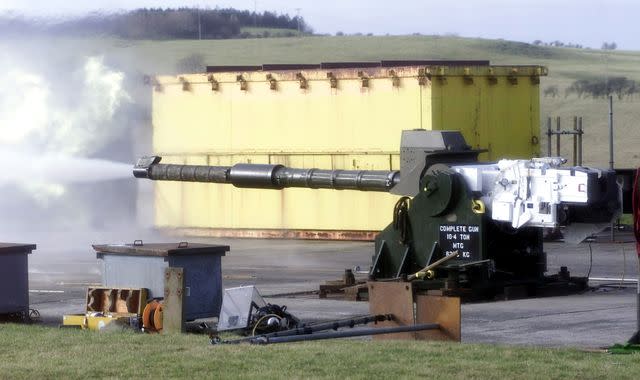What is depleted uranium? Radiation risks explained after Putin's warning to UK over tank shells for Ukraine

Russia has accused the UK of increasing the chances of a "nuclear collision" by supplying Ukraine with armour-piercing depleted uranium tank shells.
President Vladimir Putin warned Russia would have to "respond accordingly", as he seized another chance to threaten a nuclear escalation in the Ukraine war.
Minister of state for defence Baroness Annabel Goldie confirmed some of the ammunition for the Challenger 2 battle tanks that Britain is sending to Ukraine includes armour-piercing rounds which contain depleted uranium.
What are the actual risks associated with such ammunition, though? And why do tank shells contain depleted uranium in the first place?
What is depleted uranium?
Depleted uranium (DU) is the material left behind after most of the highly radioactive form of uranium - known as U-235 - is removed from natural uranium ore.
U-235 provides the fuel used to produce nuclear power and the powerful explosions used in nuclear weapons.
DU is less radioactive, mainly emitting alpha particles, which don't have enough energy to go through skin, so exposure to the outside of the body is not considered a serious hazard.
It can be a serious health hazard, however, if it is swallowed or inhaled.
What is depleted uranium ammunition?
DU is used in weapons because it can penetrate tanks and armour more easily due to its density and other physical properties.
The International Atomic Energy Agency (IAEA) says DU is used for both armour-piercing weapons and armour itself.
Shells containing DU become sharper and ignite as they come into contact with armour.
Are uranium tank shells nuclear weapons?
According to the UN Institute for Disarmament Research, depleted uranium ammunition cannot be considered as nuclear weapons.
It says depleted uranium does not meet the legal definitions of nuclear, radiological, toxin, chemical, poison or incendiary weapons.
Read more:
The Putin-Xi bromance is increasingly unbalanced
But are there any radiation risks?
The IAEA says inhaled or ingested uranium can be harmful "in sufficient amounts" because of its "chemical toxicity".
Its main risk is chemical, rather than radioactive. In high concentrations in the body, uranium can cause kidney failure because of its chemical toxicity, for example.
However, as with any radioactive material, there are cancer risks. But it could take years for any effects to show.
When it comes to DU, the risks are lower. Depleted uranium is considerably less radioactive than natural uranium.
But with shells containing DU, the main risk is of inhaling aerosols released on impact with an armoured target.
Longer-term risks are possible from DU left behind in the soil on battlefields, for example. There are some concerns DU could contaminate water or food supplies if it seeps into the soil in the wrong place over the years. The risk decreases as time goes on, though.
Therefore, the IAEA highlights the riskiest level of contact as handling a shell or other type of DU ammunition directly.
Even then, skin burns or "any other acute radiation effect" is unlikely.
But it adds: "Nevertheless, the dose that could be delivered from handling of DU ammunitions is such that the exposure and handling time should be kept to a minimum and protective apparel (gloves) should be worn."
Putin: Weapons have 'nuclear component'
The Russian president was hosting his Chinese counterpart President Xi Jinping for a summit in Moscow this week when he responded to the reports of the UK supplying Ukraine with DU shells.
He said: "If all this happens, Russia will have to respond accordingly, given that the West collectively is already beginning to use weapons with a nuclear component."
Russia's defence minister, Sergei Shoigu, went further. He claimed the British decision on shells left fewer and fewer steps before a potential "nuclear collision" between Russia and the West.
"Another step has been taken, and there are fewer and fewer left," he told reporters in remarks cited by domestic agencies.
MoD: 'Nothing to do with nuclear weapons'
The UK does not consider depleted uranium rounds a nuclear capability.
And it should be said, Russia also uses depleted uranium-based ammunition.
Britain's Ministry of Defence (MoD) said the use of armour-piercing DU shells is "standard" in modern warfare.
As Sky's defence and security editor Deborah Haynes pointed out on Tuesday, for the MoD to issue a statement responding to Putin at all was highly unusual.
But it clearly wanted to dampen talk of it contributing to a nuclear escalation as quickly as possible.
The MoD said in a statement: "Alongside our granting of a squadron of Challenger 2 main battle tanks to Ukraine we will be providing ammunition, including armour piercing rounds which contain depleted uranium.
"Such rounds are highly effective in defeating modern tanks and armoured vehicles.
"The British Army has used depleted uranium in its armour-piercing shells for decades.
"It is a standard component and has nothing to do with nuclear weapons or capabilities. Russia knows this but is deliberately trying to disinform.
"Independent research by scientists from groups such as the Royal Society has assessed that any impact to personal health and the environment from the use of depleted uranium munitions is likely to be low."
'Devastating impact on civilians'
There are campaigners who think the use of DU shells is dangerous, however.
The Campaign for Nuclear Disarmament (CND) has called on the British government to "introduce an immediate moratorium" on its use of ammunition using depleted uranium.
It also argues the government should support a global ban on its use in conventional weapons, while helping to clean up areas where they have been used.
Some countries, like Belgium and Costa Rica, have already banned the use of uranium in conventional ammunition.
On its website, the CND says: "Its use has a devastating impact on civilians caught up in conflicts across the world."
The International Coalition to Ban Uranium Weapons was based in Manchester but has since moved to Berlin.

 Yahoo News
Yahoo News 
